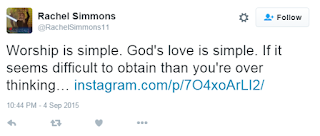 Have you been called "spiritually blind" or told that you "wouldn't believe in god if it stood in front of you?" It's insulting, right? These phrases and tactics are common in religious and other cultures which Religious culture shames doubters. Whether the language and culture is intentionally designed in that way or simply arose out of cultural evolution can be debated, but the fact remains that it happens.
Have you been called "spiritually blind" or told that you "wouldn't believe in god if it stood in front of you?" It's insulting, right? These phrases and tactics are common in religious and other cultures which Religious culture shames doubters. Whether the language and culture is intentionally designed in that way or simply arose out of cultural evolution can be debated, but the fact remains that it happens.In some churches, the shaming is overt and explicit, but it's pervasive in the culture and language of even the most liberal and open churches. After over a year of debating on Twitter with theists, this tactic has stood out as a clear and consistent technique that's used in an attempt to shame those who question or doubt.
Responses to Questions
The shaming of in-group versus out-group doubt seems different. Members of the faith are treated much more friendly than non-believers. The tactic is very effective at stifling open and honest discussion of the most fragile aspects of theism. Depending on their perspective and congregation, many theists will tell you that their church encourages questioning.
However even in these cases, there exists strong and persistent shaming of a specific type of questions: Those which question the fragile foundation of theistic belief. These are things like:
- Does a god exist?
- How can a just and loving God condemn anyone to hell for torture?
- Why does God punish an innocent child for the sins of mankind? (A logical follow-up to an attempt to explain away the "Problem of Evil" by saying we live in a fallen world or man's free-will causes suffering)
- Has God ever told you something you didn't already know?
- Any challenge or doubt of the divinity of Jesus (e.g. How do we know jesus really did the miracles in the Bible? None of them left a trace.)
Common responses designed to shut down further questions:
- You're overthinking it (one of my personal favorites)
- Questioner's fault.
- You just have to have faith.
- Implies that the doubt or question is a failure on the questioner's part.
- God has a plan which we are not capable of understanding.
- Rather than specifically insulting the questioner, this one says all humanity is incapable of understanding God's perfect plan.
- Trust the Bible. God wouldn't lie / is not the Deceiver (a reference to Satan)
Responses to Outside Doubt
The most common response to shut down challenges from someone outside theism is to attack their personal character or insult their to imply that god is so obvious that the nonbeliever must be handicapped (e.g. "spiritually blind").
- You're unable to see your own bias against Christianity
- Rather than address the question, the theist charges a doubter with bias and bigotry.
- You must be struggling with faith.
- You and those on your side are completely biased to oppose every argument for Christianity
- You're not really an atheist. You're rebelling against a god you really know exists
- This one is an insult to personal character -- calling the opponent a liar. It's also based in scripture (Romans 1:20). To a believer who thinks the Bible is infallible, there's no way to even address this belief. You MUST be lying because no part of their Bible could possibly be wrong.
- You are invincibly blind to your own arrogance, hatred and hypocrisy (all this for asking hard questions or expressing reasonable doubt)
- You actually hate god. You're "swine" and I won't cast my brilliant "pearls" in front of you.
- Also: I'm a good person for attacking you now in the hopes my god won't torture you later.
- You're just like the doubters and haters Paul described in Romans 1 & 18. So your doubt and refusal to accept my claims means my book made a prophecy and is therefore true in its entirety.
Stupid Challenges to Atheists
- You have no morals
- Without God, what is the meaning to life?
- [Insert despot here] was atheist
I'm not sure any of these even justify a response, but I've got a couple gems:












